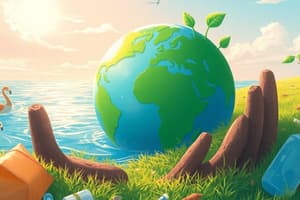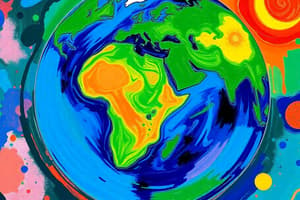Podcast
Questions and Answers
What is the gaseous envelope surrounding the earth composed of?
What is the gaseous envelope surrounding the earth composed of?
- H2O (correct)
- N2 (correct)
- O2 (correct)
- CO2 (correct)
Climate change is largely a result of combustion of fossil fuels.
Climate change is largely a result of combustion of fossil fuels.
True (A)
What is the main role of the ozone layer?
What is the main role of the ozone layer?
- Protect against hurricanes
- Conserve water sources
- Absorb dangerous ultraviolet rays from the sun (correct)
- Regulate global warming
Acid rain is formed when oxides of Nitrogen and Sulphur are dissolved in ____ water.
Acid rain is formed when oxides of Nitrogen and Sulphur are dissolved in ____ water.
What is the main cause of soil pollution from agriculture?
What is the main cause of soil pollution from agriculture?
Global warming can have a negative impact on biodiversity.
Global warming can have a negative impact on biodiversity.
What are CFCS mainly used for?
What are CFCS mainly used for?
The main threat to biodiversity due to loss of natural communities is caused by ______________.
The main threat to biodiversity due to loss of natural communities is caused by ______________.
Flashcards are hidden until you start studying
Study Notes
Environmental Pollution
- The lithosphere includes the soil, which covers the rock crust.
- The hydrosphere includes all surface and groundwater resources, making up 80% of the Earth's surface.
- The atmosphere is composed of an entire mass of air containing N2, O2, H2O, CO2, and other gases.
- Measures to control pollution:
- Raise chimneys to disperse smoke and particulate matter.
- Recycle and reuse harmful chemicals.
- Control fuel use and exhaust emissions.
- Locate industries away from residential areas.
- Use non-combustive sources of energy (e.g., solar, tidal, wind power).
- Promote afforestation and use of plants that reduce pollutants.
Water Pollution
- Sources:
- Sewage (organic and inorganic waste).
- Agricultural pollution (inorganic fertilizers, pesticides).
- Industrial pollution (effluents).
- Oil pollution (oil leaks).
- Thermal pollution (hot effluents, heated water).
- Marine pollution (industrial waste, sewage, fertilizers).
- Effects:
- Underground water pollution.
- Damage to machines and aquatic life.
- Health problems (e.g., headaches, fevers, kidney issues).
- Control measures:
- Prohibit untreated effluent discharge.
- Remove solid waste before releasing water.
- Purify water through biological treatment and disinfection.
- Recycle sewage for bio-gas and organic fertilizer.
- Monitor water quality and promote afforestation.
Noise Pollution
- Causes:
- Natural sounds (thunder, rain, wind).
- Man-made sounds (factories, urban areas, public places).
- Automobiles and aircraft.
- Loud speakers and communication devices.
- Unnecessary horn blowing.
- Socio-religious ceremonies.
- Effects:
- Health problems (nerves, digestion, sleep disorders).
- Deafness.
- Barrier to communication.
- Control measures:
- Use silencers and lubricators.
- Discourage unnecessary horn blowing.
- Locate industries away from populated areas.
- Protect ears from damage.
- Establish sound-proof cabins.
- Educate citizens about noise pollution.
Soil Pollution
- Sources:
- Pesticides and fertilizers.
- Chemicals (industrial waste, acid rain).
- Dead bodies and solid waste.
- Radioactive elements.
- Air and water pollutants.
- Effects:
- Soil quality degradation.
- Decreased productivity.
- Harm to living organisms.
- Increased salinity.
- Control measures:
- Use manure and bio-fertilizers.
- Implement proper irrigation facilities.
- Use natural pesticides.
- Improve mining techniques.
- Properly dispose of industrial waste.
- Plant soil-binding grasses and afforest.
- Control overgrazing.
- Educate people.
Global Environmental Challenges
- Climate change:
- Causes: greenhouse gas emissions, fossil fuel combustion, agriculture, and land-use changes.
- Effects: temperature increase, sea-level rise, ocean circulation changes, and ecosystem disruption.
- Control measures:
- Reduce carbon dioxide production.
- Reduce vehicular traffic.
- Educate people.
- Deforestation:
- Causes: industrialization, fossil fuel use, and lack of awareness.
- Effects: fertile area shifts, temperature increase, and ocean flooding.
- Control measures:
- Reduce fossil fuel use.
- Reduce vehicular traffic.
- Educate people.
Acid Rain
- Sources:
- Nitrogen, sulfur, and phosphorus oxides.
- Burning of coal and phosphates.
- Effects:
- Damage to iron and cement structures.
- Harm to plants and animals.
- Control measures:
- Desulfurize coal.
- Use alkali pots.
- Whitewash buildings with lime.
Ozone Layer Depletion
- Cause:
- Chlorofluorocarbons (CFCs) and halons.
- Effects:
- Ozone layer destruction.
- Harm to life on Earth.
- Control measures:
- Reduce chlorine use.
- Research alternative compounds.
- Spray alkanes to neutralize CFCs.
Biodiversity Threats
- Major threats:
- Population growth and resource consumption.
- Global warming.
- Habitat conversion and sprawl.
- Exotic and invasive species.
- Over-hunting/commercial exploitation.
- Environmental degradation.
- Effects:
- Loss of natural habitats.
- Deprivation of species.
- Loss of biodiversity.
- Control measures:
- Conserve resources.
- Reduce population growth.
- Preserve natural habitats.
- Promote sustainable development.
Studying That Suits You
Use AI to generate personalized quizzes and flashcards to suit your learning preferences.





